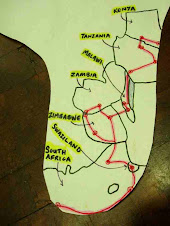General Assembly, Day Four
In the afternoon general assembly, the meeting felt like a continuation of the morning session. One after another, people stood up and spoke powerful statements about their concerns but there lacked a cohesive structure to funnel the energy into something productive…
They did open the session (after an hour of waiting and singing and chatting) with a General Statement in conclusion of the 2007 WSF. Here are my spotty notes:
“We social movements from across Africa and the world have come together to highlight and celebrate social movements. We celebrate the WSF as a space of struggle and solidarity” … and then it focused on one of the protests of the event: “hundreds of Kenyans have been excluded because of the high cost of attending…” and then into the more general: “we are concerned by some organizations here working against the rights of women” and “we reject all tendencies towards the commercialization, militarization and privatization of the WSF.” They then made a proclamation of solidarity with Latin American countries who are in struggle. And then they called for an International Day of Action, to replace the WSF next year.
After this statement, they asked for reflections… “does this statement capture the spirit of the WSF?” Now, how were they really going to get feedback from the hundreds of people in the crowd? The comments were interesting, yes, but what were we collectively supposed to do?
Here’s what people said:
Kenyan man: Comrades, I greet you in the name of the struggle. We were so afraid to find out that the Minister of Internal Security was running a restaurant here because he is the torturer of the Mau Mau people who we brought here to speak. We also question the role of some NGOs who…. (I missed the details)
Samir from the World Forum for Alternatives: The popular movements in struggle all over the world have been movements of resistance, against neoliberalization. Yet the movement has to move from popular resistance to offensive. Recent successes in Latin America have shown us that peace is possible.
Woman from Kibera (Nairobi’s biggest slum): We changed our name from “slums” to “People’s Settlement Networks!” ;-)
Man from Guinea, a leader of a trade union: We ask for support for the democratization of our country. We have been in strike for two weeks.
Woman from the People’s Parliament of Kenya: The People’s Parliament is place where ordinary citizens can discuss their problems. We represent those who are too poor to travel to other WSFs. The WSF brings the world to me as a poor person… not just the world but the best of the world. However, I am concerned that many Kenyans could not come—we had to protest every day. It is not fair to hold the WSF in Kenya and not allow the Kenyans to attend. We are fighting to be recognized. So we set up a stage in a park downtown to discuss the same things as here. It’s was the Poor People’s Social Forum
Pumi from the World March of Women and LGBT South-South Dialogue: This year we organized the fourth forum on sexual diversity. We need to decriminalize same sex conduct in every country. In a diverse world, equality must be first.
Samisu from Niger: I represent a network on debt. I am a member of Jubilee South. The Social Forum failed to do something… it is not right to discriminate against people.. this is dominated by neoliberalization. [Note, this was hard to hear or understand because he was yelling in French and the interpreter could hardly keep up.]
Farai from Zimbabwe: We are living with a dictatorship. They took over on May 18th and we propose that be the International Day of Action next year.
Man from Haiti: I come with a resolution made by 40 organizations here. We denounce the dominations exerted by debt. We require that it be cancelled. Debt is an illegal situation which impoverishes more people than it helps. There has been some progress in Norway. We need more.



No comments:
Post a Comment